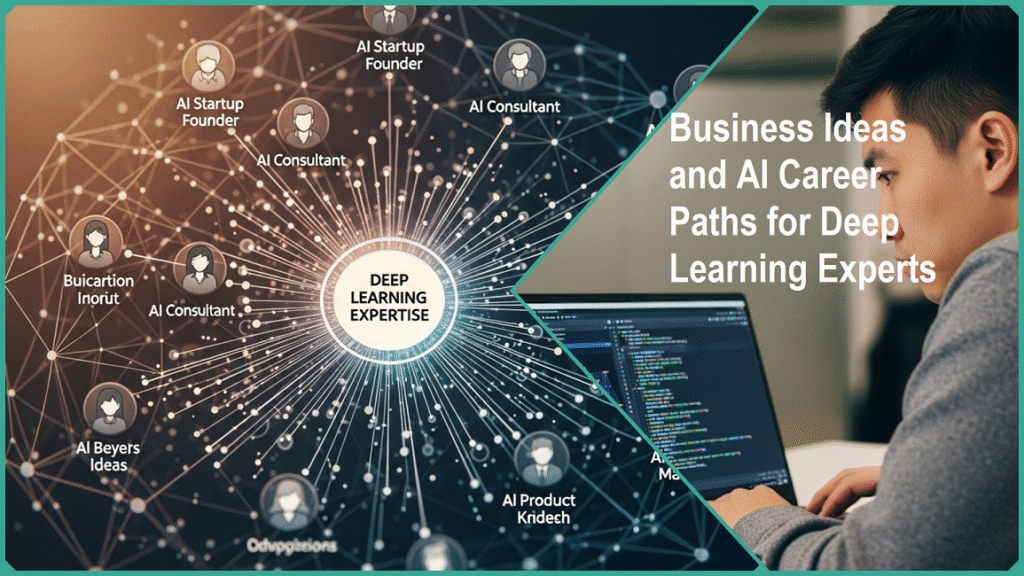Business Ideas and AI Career Paths for Deep Learning Experts
Estimated reading time: 29 minutes
Deep learning, a powerful branch of artificial intelligence (AI), is transforming industries worldwide. Experts skilled in this field have exceptional opportunities to advance their careers and launch innovative businesses. By training neural networks on vast datasets, deep learning tackles complex challenges in areas such as computer vision, natural language processing, and robotics.
Its impact spans diverse sectors, including healthcare, finance, marketing, and autonomous vehicles, driving groundbreaking advancements across the board. For professionals skilled in deep learning, this presents exciting opportunities to carve out fulfilling career paths or launch cutting-edge AI businesses.

This article explores the various career opportunities in AI for deep learning specialists and highlights practical business ideas that utilize deep learning technology. Grasping the dynamic AI landscape is essential for professionals to match their expertise with the most rapidly expanding and influential roles or to pursue innovative ventures that have the potential to transform industries.
Whether you’re an experienced expert aiming to advance, an aspiring professional mapping your career path, or an entrepreneur exploring AI-driven opportunities, this guide will inform, inspire, and empower you. It offers a comprehensive overview of AI career paths, emerging roles, and innovative business ideas tailored for deep learning specialists, along with practical advice for transitioning or launching new ventures.
Key Concepts and Theories in AI Careers for Deep Learning Experts
Before diving into the various AI career paths available for deep learning experts, it is crucial to first gain a thorough understanding of several key concepts and foundational roles that shape the broader AI landscape.
These fundamental roles encompass a range of overlapping yet distinct skill sets, including advanced programming abilities, strong mathematical knowledge, specialized domain expertise, and vital soft skills such as effective communication and efficient project management. Grasping these elements will provide a solid base for navigating the complex and evolving field of artificial intelligence.
Key AI Roles for Deep Learning Experts
Deep learning expertise opens doors to a wide array of highly specialized and impactful roles within the ever-evolving artificial intelligence landscape. By mastering deep learning techniques, professionals can access numerous career opportunities that require advanced knowledge and hands-on experience.
Let’s take a closer look at the most prominent and in-demand AI career paths where deep learning skills are not just valuable but essential for success and innovation.
Deep Learning Engineer
This professional is responsible for designing, building, and optimizing advanced deep neural networks aimed at solving a wide range of complex problems, including image recognition, natural language processing (NLP), and predictive analytics. The role demands a strong proficiency and hands-on experience with popular deep learning frameworks such as TensorFlow and PyTorch.
Additionally, a solid foundation in fundamental algorithms and data structures is essential to effectively develop and fine-tune these sophisticated models for high performance and accuracy in various applications.
Machine Learning Engineer
This role focuses more broadly on the development and management of machine learning systems and models, which often overlap with deep learning tasks and techniques. Key responsibilities include building and managing data pipelines, overseeing the entire model training process, deploying models into production, and ensuring that these systems are scalable and efficient in real-world applications.
Having deep expertise in programming languages like Python, familiarity with various cloud computing platforms, and proficiency in MLOps tools and frameworks is essential for success in this position. The engineer must also ensure smooth integration and continuous monitoring of machine learning models in production environments.
Data Scientist
A professional who extracts meaningful and actionable insights from large, complex, and often unstructured datasets by applying a variety of advanced statistical methods, machine learning algorithms, and frequently deep learning models. Data scientists play a crucial role in analyzing and interpreting data to guide strategic business decisions.
They typically require a strong skill set that includes data wrangling to clean and prepare data, data visualization to effectively communicate findings, and domain-specific knowledge to ensure that insights are relevant and can be translated into tangible business value and impact.
AI Researcher
They specialize in developing innovative algorithms and pushing forward the theoretical foundations and practical applications of artificial intelligence. This position usually requires a strong and thorough understanding of mathematics, statistical analysis, and experimental research techniques.
Professionals who work in this role are frequently involved in publishing detailed scholarly papers, presenting their research findings at national and international conferences, and playing an active role in driving pioneering advancements within the rapidly evolving and dynamic field of artificial intelligence technology.
Computer Vision Engineer
This specialist focuses on enabling machines and computer systems to effectively interpret, process, and analyze visual data, including images and videos, by utilizing advanced deep learning models such as convolutional neural networks (CNNs).
Their expertise is essential in developing technologies for various applications, including autonomous vehicles that rely on accurate visual perception, sophisticated surveillance systems that monitor environments in real-time, and cutting-edge medical imaging techniques that assist in diagnosing and treating diseases.
This role plays a crucial and indispensable part in significantly advancing the capabilities of machines to effectively see, interpret, and understand the complex world around them in a meaningful and intelligent manner.
Natural Language Processing (NLP) Specialist
Responsible for designing and developing highly sophisticated and advanced systems that can understand, generate, translate, or summarize human language in a way that is both meaningful and contextually relevant, ensuring effective communication and interaction between machines and humans.
These experts frequently employ cutting-edge transformer models such as BERT and GPT to create advanced applications, including chatbots, virtual assistants, and language translation tools that facilitate seamless human-computer interaction across various languages and domains.
AI Product Manager / Strategist
Serves as a crucial liaison connecting technical teams with various business units to carefully oversee the entire development process of AI projects. This role ensures that AI initiatives are closely aligned with current market demands and organizational goals while guiding the overall strategy for AI-driven products.
It requires a deep blend of technical knowledge and strong business acumen to effectively translate complex AI capabilities into practical, marketable solutions that deliver real value to customers and stakeholders alike.
Skill Sets Across Roles
While every individual role requires a unique set of technical skills tailored to its specific functions and responsibilities, several common requirements tend to be essential across most positions, including:
- Programming: Python continues to be the overwhelmingly dominant programming language in the field, widely favored for its versatility and ease of use. It is frequently used in conjunction with a variety of specialized libraries and frameworks that enhance its functionality, such as TensorFlow for deep learning, PyTorch for neural networks, scikit-learn for machine learning algorithms, and OpenCV for computer vision tasks. These powerful tools make Python an indispensable language for developers working on cutting-edge technologies.
- Mathematics plays a fundamental role in the field of artificial intelligence, with key areas such as linear algebra, calculus, probability, and statistics forming the essential foundation for both understanding and advancing AI models. These mathematical disciplines provide the critical tools and frameworks needed to analyze data, optimize algorithms, and develop sophisticated machine learning techniques that drive AI innovation forward.
- Domain Expertise: Having a deep understanding of the specific industry context in which AI is applied significantly enhances the relevance and overall impact of the models being developed. This specialized knowledge helps tailor AI solutions to address unique challenges and requirements within that particular sector.
- Soft Skills: Effective communication, strong teamwork abilities, and proficient project management are critical for successfully coordinating complex multidisciplinary AI projects. These skills enable professionals to work collaboratively across different fields and ensure that technical concepts are clearly and accurately conveyed to a diverse range of stakeholders, facilitating better understanding and decision-making throughout the project lifecycle.
Gaining a clear understanding of these various roles and their essential foundational requirements allows deep learning professionals to strategically plan and tailor their career development more effectively. This knowledge helps them to identify suitable specialization paths that not only align closely with their interests but also meet the evolving demands and expectations of the industry, ultimately positioning themselves for greater success and growth opportunities.
Current Trends and Developments in AI Career Paths
The AI job market is continuing to experience rapid and significant growth and transformation throughout 2025, fueled by strong enterprise adoption and an expanding demand for AI expertise across a wide range of industries.
Current trends and developments in AI career paths, specifically for deep learning experts, reflect this highly dynamic and evolving environment:
Market Growth
AI-related job postings in the U.S. experienced a significant increase of 25.2% from the first quarter of 2024 to the first quarter of 2025, demonstrating consistent and steady growth every quarter. Salaries in the AI sector remain highly competitive, with the median annual pay for AI roles estimated to be around $157,000, reflecting the high demand and specialized skills required.
On a global scale, business investment in artificial intelligence technologies has experienced a significant surge, reaching an impressive 86%. This substantial increase in funding and resources dedicated to AI is a major driving force behind the optimistic projections that estimate the creation of between 20 to 50 million new jobs related to artificial intelligence by the year 2030.
This trend highlights the growing importance of AI in various industries worldwide and underscores its potential to transform the job market in the coming decade. Hiring in the AI field has seen an impressive 42% increase over the past two years in key markets such as India, with projections indicating a further growth of approximately 14% expected throughout 2025.
Prominent Career Paths
| Career Path | Focus Area | Key Skills/Tools | Career Progression |
|---|---|---|---|
| Machine Learning Engineer | Model development & deployment | Python, TensorFlow, PyTorch | Junior ML Engineer → Senior Engineer → AI Architect |
| AI Researcher | Algorithm innovation & theory | Research methodologies, math | Assistant → Research Scientist → Lead Scientist |
| Data Scientist | Data analysis & insights | SQL, Python, R, visualization | Data Analyst → Data Scientist → Analytics Manager |
| Computer Vision Engineer | Visual data interpretation | OpenCV, CNNs, image processing | CV Engineer → Senior CV Engineer → CV Team Lead |
| NLP Specialist | Language models & applications | Transformers, GPT, BERT | NLP Engineer → Senior NLP Specialist → NLP Architect |
| AI Ethicist | Responsible and ethical AI usage | Philosophy, policy frameworks | Advisor → Ethics Officer → Director of AI Ethics |
| AI Product Manager | Business strategy & product delivery | Business acumen, technical knowledge | Product Owner → Product Manager → Director of AI Products |
Emerging and Niche Roles
New and emerging specializations have increasingly gained significant traction in recent years, reflecting the rapidly expanding complexity of artificial intelligence as well as its diverse range of applications across various domains. These specialized fields now include:
- AI Explainability Specialist: This role is dedicated to enhancing the transparency and interpretability of complex black-box AI models. The specialist works to ensure that these models are not only accurate but also understandable and trustworthy for users, enabling better decision-making and increased confidence in AI systems.
- AI Safety Engineer: Responsible for ensuring that AI systems consistently avoid any unintended or harmful behaviors while operating reliably and securely. They work to implement safety protocols and monitor AI performance to prevent potential risks and vulnerabilities in various applications.
- Domain-Specific AI Experts: These professionals specialize in various fields such as healthcare AI, finance AI, legal AI, and other rapidly expanding verticals. Their expertise focuses on developing and implementing artificial intelligence solutions tailored specifically to the unique needs and challenges of these fast-growing industries.
Geographical and Sectoral Expansion
The growth of AI-related jobs is no longer limited to just the major technology hubs around the world. Cities across India, such as Bengaluru, Delhi, and Hyderabad, are experiencing rapid increases in AI job opportunities. Similarly, emerging markets like Brazil are also showing significant and fast-paced growth in roles related to artificial intelligence.
The sectors leading the charge in hiring AI talent encompass a diverse range, including IT services, software development, internet companies, as well as staffing and recruiting firms, all actively expanding their AI workforce to meet increasing demand.
Skills Over Degrees
In today’s rapidly evolving job market, employers are increasingly prioritizing practical, hands-on skills over traditional formal degrees. Key competencies such as Python programming, machine learning engineering, data science, MLOps, and robotics process automation have become highly sought after and often take precedence over academic qualifications.
Additionally, there is a growing trend in hiring for highly specialized roles, including AI prompt engineers and model evaluators, reflecting the demand for expertise in cutting-edge technologies and innovative applications. This shift highlights the importance of continuous learning and skill development to stay competitive in the workforce.
Salary and Compensation
The high demand for skilled AI talent continues to significantly drive up compensation levels across the industry. Salaries for AI experts, particularly for specialized roles such as machine learning engineers and researchers, are consistently rising at a steady pace.
Leading companies and top-tier firms are increasingly offering multimillion-dollar compensation packages to attract and retain the most elite and highly sought-after talent in the field.
AI Integration and Impact
The adoption of artificial intelligence is rapidly accelerating both revenue growth and productivity across a wide range of industries worldwide. Job roles that enhance and augment human expertise with AI technologies are expanding significantly, creating new opportunities for workers to leverage these powerful tools.
At the same time, full automation driven by AI is transforming and impacting certain traditional jobs, leading to shifts in workforce demands. As a result, the job market is evolving considerably to place greater emphasis on effective collaboration and partnership between human employees and AI systems, reshaping how work gets done in the modern economy.
In Summary
Deep learning experts can anticipate a highly robust and continuously expanding job market in 2025, featuring a wide array of specialized career paths that cater to various interests and skill sets. This landscape is marked by strong and consistent salary growth, reflecting the increasing demand for advanced expertise in this field.
Additionally, there is a notable geographic diversification of opportunities, with positions available across numerous regions and industries worldwide. Employers are placing a growing emphasis not only on applied technical skills but also on ethical practices, ensuring responsible development and deployment of AI technologies.
Furthermore, new and emerging roles focused on explainability, safety, and domain-specific AI applications are broadening the spectrum of career options. These opportunities are especially promising for professionals who are eager to adapt, continuously learn, and evolve alongside the rapidly advancing technology.
Business Ideas for Deep Learning Experts
Deep learning’s transformative potential has opened a wealth of entrepreneurial opportunities for experts ready to apply their skills beyond traditional roles. Thanks to accessible AI frameworks, scalable cloud platforms, and robust open-source models, launching a specialized business or consultancy service in this domain is more achievable than ever.
Here are high-potential business ideas for deep learning professionals, each ranked for market viability and innovation potential, with details on scope, typical services, and strategic benefits.
AI-Powered Content Marketing Agency
- Scope: Utilize cutting-edge natural language processing (NLP) techniques along with state-of-the-art generative AI models to efficiently automate and significantly enhance a wide range of marketing functions and activities for diverse businesses. These advanced technologies aim to streamline processes, improve accuracy, and boost overall marketing performance across multiple channels.
Typical Services:
- Automated blog, article, and ad copy generation
- Algorithm-driven SEO optimization and analytics
- Social media content scheduling and audience targeting
- Personalized customer outreach via email or chatbots
- Benefits:
- The demand for scalable, cost-effective marketing is surging, especially among SMEs. Agencies that integrate tools like GPT-4, Cohere, or Jasper can offer end-to-end solutions—from content creation to performance analytics—at a fraction of the time and cost required by traditional agencies.
- Example: Jasper was valued at over $1.5B in 2023 and serves thousands of businesses needing AI-generated marketing content.
AI-Based Personal Assistants and Chatbots
- Scope: Design and develop advanced domain-specific conversational AI solutions that effectively automate customer and client interactions while significantly streamlining operational processes. These tailored AI systems will cater to specialized industries such as healthcare, legal services, finance, and e-commerce, addressing unique challenges and requirements within each vertical to enhance efficiency and user experience.
Typical Solutions:
- Virtual assistants for appointment management in healthcare
- Legal chatbots for contract review and compliance
- Customer service bots for e-commerce, telecom, or banking
- Multilingual support and real-time translation assistants
- Benefits:
- With LLMs and specialized dialog management tools, chatbots can now handle complex, contextual conversations, dramatically reducing customer support costs and response times.
- Case Study: Babylon Health scaled its AI chatbot to triage millions of patient interactions, reducing clinical workload by over 30%.
Custom Deep Learning Model Development
- Scope: Serve as a specialized consultant or boutique firm dedicated to designing, training, and deploying highly customized deep learning solutions tailored specifically for businesses that do not have internal expertise or resources in artificial intelligence. This includes working closely with clients to understand their unique challenges and requirements, and delivering end-to-end AI implementations that drive meaningful business outcomes.
Potential Projects:
- Computer vision for quality control and automation in manufacturing
- Speech-to-text or voice recognition systems for accessibility products
- Recommendation engines for e-commerce and streaming platforms
- Time series analysis models for predictive maintenance in logistics
- Benefits:
- Smaller firms and legacy industries often lack the resources to recruit full-time AI teams, making consulting partners highly valuable for AI transformation projects.
- Industry Trend: The global AI consulting market is predicted to reach $30B by 2028, driven by demand from mid-sized companies.
AI-Driven Predictive Analytics Platforms
- Scope: Develop SaaS products or internal tools designed to analyze complex data sets by leveraging advanced deep learning techniques. These solutions aim to accurately forecast future trends, predict customer behaviors, and anticipate various operational outcomes, thereby enhancing decision-making processes and driving business growth.
Markets Served:
- Finance: Stock price prediction, fraud detection
- Retail: Demand forecasting, inventory management
- Logistics: Route optimization, predictive maintenance
- Human Resources: Employee attrition and performance modeling
- Benefits:
- Deep learning outperforms traditional analytics in large, complex datasets, delivering actionable business insights.
- Example: DataRobot, a leading predictive analytics platform, recently secured $1B+ in funding for its enterprise solutions.
AI-Enhanced Cybersecurity Solutions
- Scope: Implement advanced AI technologies to fully automate the processes of threat detection, malware classification, intrusion prevention, as well as response activities within comprehensive digital security systems. This deployment aims to enhance efficiency and accuracy in safeguarding digital environments against evolving cyber threats.
Service Offerings:
- Anomaly detection in network traffic or endpoints
- Automated phishing and ransomware identification
- Real-time incident response automation and forensics
- Benefits:
- The growing sophistication of cyber-attacks increases demand for adaptive security. Deep learning’s anomaly-detection capabilities can find unknown threats that signature-based tools miss.
- Industry Note: Darktrace, an AI cybersecurity firm, is a leader in this fast-growing market.
AI Education and Training Services
- Scope: Develop comprehensive educational products and consulting services designed to significantly enhance the skills of professionals and businesses. Focus on providing in-depth training in AI best practices, cutting-edge tools, and effective strategies to ensure they are well-equipped to leverage artificial intelligence in their respective fields.
Potential Products:
- Online courses and bootcamps for deep learning
- Corporate workshops on AI-driven transformation
- Instructional content for regulatory compliance in AI
- Benefits:
- An ongoing skills gap in AI creates strong and sustained demand for quality education and re-skilling programs.
- Statistics: Global AI education spending surpassed $1.3B in 2024 and is projected to double by 2027.
AI-Powered SEO and Digital Marketing Tools
- Scope: Develop or white-label advanced AI-powered platforms specifically designed to automate a wide range of SEO-related tasks. These tasks include comprehensive content optimization to enhance relevance and ranking, detailed backlink analysis to improve link-building strategies, and continuous performance tracking to monitor SEO effectiveness and identify areas for improvement.
Capabilities:
- Automatic keyword strategy updates based on trend analysis
- Real-time website audit and UX improvement suggestions
- Personalized link-building campaign planning
- Benefits:
- SEO is critical for business visibility; AI tools can outperform manual strategies with continuous learning on search algorithm updates.
- Product Example: Surfer AI combines NLP and analytics for automated content ranking improvements, used by thousands of marketers globally.
Why These Ideas Stand Out
- Market Validation: Each of these innovative ideas has been thoroughly proven and validated in the marketplace, demonstrating significant and consistent growth through rising levels of investment, increasing user adoption rates, and a notable surge in acquisition activity by key industry players. This strong market validation underscores the potential and viability of these concepts in real-world applications.
- Barrier Reduction: Open-source models, cloud-based AI platforms, and a wealth of comprehensive training materials significantly enable rapid prototyping and product launches without the need for massive upfront investments or extensive resource commitments. These accessible tools and resources have lowered the entry barriers, allowing developers and organizations to innovate quickly and efficiently in the AI space.
- Scalability: Most ideas present significant potential for generating recurring revenue streams, such as through Software as a Service (SaaS) models or ongoing training subscription services. Additionally, these ideas often enable businesses to expand their reach on a global scale by leveraging cloud-delivered services that can be accessed from anywhere in the world, allowing for continuous growth and market penetration across diverse regions.
- Competitive Differentiator: Combining extensive domain expertise with advanced mastery of deep learning techniques enables us to create unique, innovative solutions that are specifically tailored to meet the complex and evolving needs of various industries—thereby establishing a strong and defensible niche in the market.
Key Considerations for Launch
- Identify Real Problems: Select a specific vertical or a particular pain point that has urgent and unresolved needs that require immediate attention. Conducting detailed customer interviews and running comprehensive pilot studies are incredibly valuable methods to gain deep insights and validate the existence and scope of these problems effectively.
- Build Lean MVPs: Utilize advanced cloud-based AI technologies, leverage extensive open datasets, and apply agile development methodologies to efficiently create minimum viable products. This approach allows you to rapidly develop, launch, and test your ideas in the market, ensuring quick feedback and iterative improvements.
- Prioritize Trust and Ethics: It is essential to emphasize legal compliance, maintain complete transparency, and actively work on bias mitigation, particularly in sensitive and highly regulated sectors such as healthcare and finance. Upholding these principles ensures the integrity and reliability of operations while fostering trust among clients and stakeholders in these critical industries.
- Network & Partner: Engage actively with a wide range of businesses, industry associations, and research networks to build strong collaborations. These partnerships are essential not only for gaining valuable domain expertise but also for securing access to pilot customers who can provide critical feedback and validation during the early stages of development. Establishing these connections helps create a robust ecosystem that supports innovation and growth.
By concentrating on practical, real-world challenges and targeting well-defined strategic market segments, deep learning professionals have the potential to develop highly robust and impactful AI businesses that will thrive in 2025 and well into the future. This approach not only addresses immediate needs but also positions companies at the forefront of technological advancement and market demand.
Practical Guidance for Career Transitions and Entrepreneurship in AI
Whether progressing within well-established organizations or embarking on the journey of entrepreneurship, deep learning experts have the unique opportunity to distinguish themselves significantly by thoughtfully and strategically investing in their skill sets, building an impressive portfolio, and expanding their professional networks. This multifaceted approach not only enhances their expertise but also opens doors to new opportunities and collaborations.
Here is a comprehensive and focused guide designed to help individuals effectively navigate the complexities of AI career advancement and successfully launch innovative AI-driven businesses:
Advancing Your AI Career
- Invest in Continuous Learning: Stay competitive by enrolling in specialized courses from top platforms. For example, “Machine Learning Specialization” by DeepLearning.AI (Coursera), Stanford University’s AI offerings, and AWS AI Fundamentals provide practical, up-to-date skill sets. Regularly engaging with new research via arXiv or industry blogs also keeps your expertise sharp.
- Deepen Systems and Deployment Expertise: Beyond core model development, gain hands-on experience with AI system architecture, model optimization techniques (e.g., quantization, pruning), and scalable deployment (using Kubernetes, Docker, or cloud pipelines). This makes you indispensable for production AI environments, where robustness and scalability are critical.
- Build a Standout Portfolio: Showcase practical projects—such as open-source contributions, published research papers, or demos—that demonstrate your ability to tackle real-world AI challenges. Portfolios featuring end-to-end solutions (from data prep through model deployment) are highly valued by employers and collaborators.
- Expand Your Professional Network: Attend and participate in AI conferences (like NeurIPS, CVPR, ICML), join online forums (Reddit’s Machine Learning community, Towards Data Science), and contribute at local meetups or hackathons. Networking opens doors to mentorship, global collaborations, and early access to cutting-edge developments.
Starting an AI Business
- Identify Real-World Problems: Successful AI startups anchor around genuine, high-value problems—not just technology for its own sake. Interview domain experts and potential users to validate the need for AI solutions in sectors like healthcare diagnostics, predictive maintenance, or compliance automation.
- Engage Early with Customers: Collaborate with prospective customers during ideation. Pilot studies or prototype feedback ensure your solution aligns with real pain points and adapts to iterative improvements, minimizing wasted resources.
- Leverage Cloud AI Services for MVPs: Rapidly experiment and deploy minimum viable products (MVPs) using cloud platforms like AWS SageMaker, Google AI Platform, or Azure Machine Learning. These services reduce infrastructure overhead, enable scalable experimentation, and accelerate time to market.
- Secure Intellectual Property (IP) and Prioritize Ethics: If developing novel algorithms or applications, consult legal counsel to secure patents or trademarks as needed. Simultaneously, integrate ethical AI principles—such as transparency, fairness, privacy, and bias mitigation—into both technology and business strategy from the outset. This strengthens both user trust and compliance.
- Collaborate with Domain Experts: Partnering with specialists in fields like medicine, finance, or law ensures your AI solutions address industry-specific challenges. These partnerships help refine requirements, avoid pitfalls, and add credibility when entering regulated markets.
- Amplify Visibility with Digital Marketing and Thought Leadership: Document your AI journey through blogs, whitepapers, webinars, or open-source releases. Sharing insights establishes authority, attracts clients or investors, and builds community. Digital marketing (strategic SEO, content marketing, social media) can amplify your reach in competitive AI markets.
Summary of the Practical Guidance for Career Transitions and Entrepreneurship in AI
| Step | Why It Matters | Example Actions |
|---|---|---|
| Continuous Learning | Stay at the forefront of AI advancements | Take Coursera/Stanford/AWS/Alison AI Courses |
| System Architecture & Deployment | Handle real-world, scalable AI solutions | Explore cloud MLOps, optimize models for production |
| Portfolio Building | Demonstrate expertise to employers/clients | Publish projects, contribute to GitHub, write papers |
| Networking | Access opportunities, mentorship, trends | Attend NeurIPS, join online forums, and local meetups |
| Problem Validation | Build solutions customers need | Conduct customer interviews, pilot problem/solution fit |
| Early User Engagement | Guide product-market fit and faster iteration | Run alpha/beta tests with pilot users |
| Cloud-Based MVP | Launch quickly and cost-effectively | Use AWS SageMaker, Google AI Platform |
| IP & Ethics | Protect innovations, ensure responsible AI use | File patents, establish data privacy checks |
| Domain Partnerships | Make tech solutions relevant for industries | Partner with clinicians, bankers, lawyers |
| Thought Leadership & Marketing | Build brand, attract stakeholders | Host webinars, contribute to AI blogs |
Pro Tips:
- Upskilling is never a simple “one-and-done” process—because AI technologies evolve and advance at an incredibly rapid pace, continual and ongoing learning becomes mandatory for staying current and effective.
- Carefully documenting every step of your research and business journey not only draws valuable attention from potential stakeholders but also significantly helps in clarifying and solidifying your vision for both yourself and your entire team. This process ensures everyone involved has a clear understanding of the goals and progress being made.
- Building your business with ethics firmly at the core not only safeguards your company from potential compliance setbacks but also fosters a strong foundation of long-term trust and credibility with both users and investors alike. This ethical approach ensures sustainable growth and a positive reputation in the marketplace over time.
These carefully designed and targeted strategies empower deep learning experts with the confidence and skills they need to take the next crucial step in their careers—whether that means advancing to higher positions within established AI teams or embarking on the challenging journey of founding their AI-driven businesses that deliver real, meaningful, and lasting impact in the industry and society at large.
Case Study: AI Content Marketing Startup Success
The rapid and continuous evolution of natural language processing (NLP) alongside the advancement of transformer-based models has led to the emergence of an entirely new breed of innovative content marketing startups.
Take, for instance, the example of a recently launched AI-driven company that specifically addressed the urgent and pressing content creation needs faced by small businesses.
This startup successfully achieved scalable growth and significant market traction by effectively blending cutting-edge deep learning expertise with practical and insightful business acumen, demonstrating a powerful synergy between technology and market understanding:
How the Startup Operated
- Transformer-Based NLP Automation: The startup harnessed advanced models such as GPT and BERT to generate high-quality blog posts, product descriptions, social media captions, and newsletters on demand. These models allowed for instantly adaptable tone and subject matter, catering to diverse client industries.
- Human Editorial Oversight: Recognizing that fully automated content can sometimes lack context or nuance, the company paired AI outputs with a layer of expert editorial review. This hybrid approach ensured that all content retained brand voice, factual accuracy, and compliance with SEO best practices.
- SaaS Delivery Model: Clients subscribed to monthly plans, receiving a set quota of AI-generated, editor-approved content. An intuitive dashboard allowed customers to request, review, and approve materials, streamlining the entire process.
Results and Growth
- Scalable Affordability: By automating content production, the company dramatically reduced turnaround times and costs versus traditional agencies. Clients could access premium marketing materials at a fraction of typical rates, making sophisticated content strategies accessible to small businesses.
- Rapid Client Acquisition: Within just two years of launch, over 100 paying customers had signed contracts. The blend of fast delivery, cost savings, and consistent quality drove steady word-of-mouth referrals and strong renewal rates.
- Market Impact: The success demonstrates the sizable opportunity at the intersection of AI and content marketing. Businesses with modest budgets can now leverage enterprise-level tools, leveling the playing field with larger competitors.
Takeaways for Deep Learning Entrepreneurs
- Hybrid Human-AI Workflows Win: The most effective solutions often combine the strengths of automation with the judgment and creativity of human experts.
- NLP and Generative AI are Commercially Viable Now: Practical deployment of transformer architectures can fuel real-world business growth, especially in sectors that value speed and volume without sacrificing quality.
- Niche Focus Drives Traction: By zeroing in on small businesses—a market historically underserved by digital agencies—the startup achieved product-market fit faster and built a defensible customer base.
This case study highlights a highly repeatable and effective formula specifically designed for deep learning experts: first, identify a widespread and critical operational bottleneck that affects performance; next, automate the core workflows using advanced AI technologies to streamline processes; then, ensure the quality of the outcomes by incorporating targeted human review at key stages; and finally, deploy the solution through a scalable subscription model that supports ongoing growth and accessibility.
The results demonstrated here clearly point to significant, sustainable growth potential for similar ventures not only in the field of content creation but also across a wide range of other industries and applications.
FAQs
What skills are essential for deep learning career advancement?
To excel in deep learning careers, proficiency in Python is fundamental, as it’s the primary language for AI development. Mastery of deep learning frameworks such as TensorFlow and PyTorch enables building and deploying robust models. Familiarity with cloud platforms like AWS, Google Cloud, or Azure is increasingly valued for scalable model deployment.
Skills in algorithm optimization, data handling, and practical domain expertise are also crucial. Non-technical abilities—particularly strong communication and project management—can set professionals apart when coordinating teams or translating technical advances for business stakeholders.
How do I transition from an AI researcher to an AI product manager?
Transitioning from an AI research role to product management involves acquiring broader business strategy and product life cycle knowledge. Pursue courses or certifications in product management (e.g., Agile, Scrum, MBA electives) and study market analysis, user experience, and revenue models.
Experience working with cross-functional teams and translating AI innovations into user-friendly products is vital. Building strong communication skills to convey technical ideas to non-specialist audiences and collaborating across engineering, marketing, and sales will support this career move.
What are the biggest challenges in starting an AI business?
Common hurdles include high data acquisition and computation costs, as training deep learning models can demand significant resources. Recruiting and retaining skilled AI talent present ongoing difficulties in a competitive market.
Addressing issues of trust, transparency, and explainability in AI systems is necessary for building customer confidence and meeting regulatory requirements. Finally, ensuring your AI solution responds to genuine market needs—through thorough customer research and iterative validation—is essential for securing product-market fit and sustainable growth.
Are AI ethics considerations important for deep learning professionals?
Ethical AI is essential both for legal compliance and for societal trust. Deep learning professionals must ensure their models are fair, transparent, and accountable. This means proactively identifying and mitigating biases, ensuring privacy and data protection, and being transparent about model limitations. Failing to consider ethics can lead to reputational damage, regulatory backlash, or unintended real-world harm.
How can aspiring deep learning professionals prepare for future AI roles?
Aspiring professionals should focus on mastering mathematics (linear algebra, calculus, probability), computer science fundamentals, and hands-on experience with leading frameworks. Staying updated with the latest research and industry trends—via journals, open-source communities, and conferences—is key.
Completing real-world projects, participating in hackathons, or contributing to open-source initiatives demonstrates practical ability. Building a network through communities, forums, and mentorship will unlock job opportunities and collaborative projects early in your journey.
In Conclusion
The AI career landscape for deep learning experts is both vast and rapidly evolving, presenting a wealth of opportunities for professionals eager to make an impact. Technical roles such as machine learning engineer, computer vision specialist, and NLP expert remain in high demand, while strategic avenues—including AI product management and ethics oversight—continue to grow in importance as organizations strive to deploy responsible, innovative solutions.
The entrepreneurial ecosystem is equally dynamic. Deep learning opens doors for launching consultancies, SaaS startups, or bespoke AI-powered products that address real-world problems in sectors ranging from healthcare and finance to education and cybersecurity. The democratization of advanced AI tools and cloud infrastructure significantly lowers the barrier to entry, enabling experts to test ideas quickly and scale successful ventures.
To capitalize on these expansive opportunities, deep learning professionals should:
- Deepen their knowledge through lifelong learning, specializing in both foundational AI skills and emerging technologies.
- Stay attuned to market trends and evolving roles, such as AI explainability and safety engineering, which are shaping the future workforce.
- Build strong professional networks and portfolios, opening doors to collaborations and leadership positions.
- Prioritize ethical practices and continuous skill development to remain competitive as the field matures.
Ultimately, whether advancing within established organizations or forging new business paths, deep learning experts who embrace both technical excellence and thoughtful market awareness will find themselves uniquely positioned to thrive and lead in the next wave of AI innovation.
Discover more from Skill to Grow
Subscribe to get the latest posts sent to your email.






